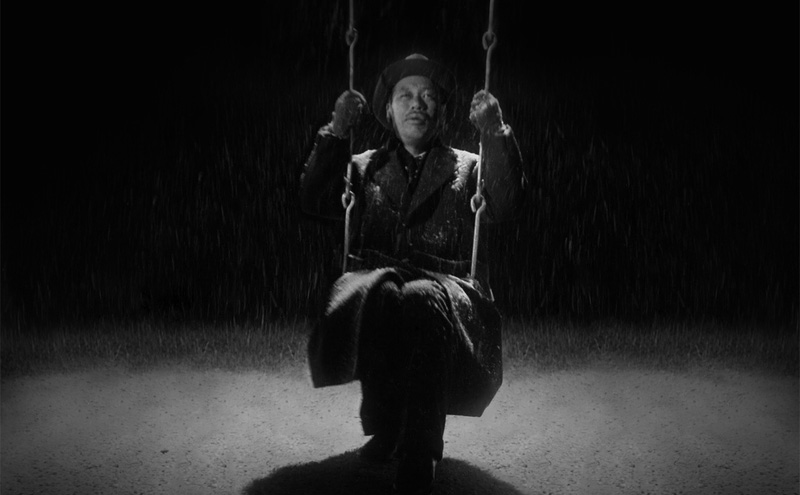
Akira Kurosawa – Ikiru (1952)
Director: Akira Kurosawa (Japan)
Akira Kurosawa was born in Tokyo, Japan, on March 23, 1910, as the youngest child of seven children by an officer descended from Samurais, and a woman that came from a family of merchants in Omori, Tokyo.
Initially, Kurosawa found himself drawn to art. After finishing high-school, he studied at the Doshisha School of Western Painting, where he devoted himself to pictorial creation. It is important to emphasize that the deep and sensitive plastic sense presented in his films, definitely came from the explorations that he made in this period of lucidity and discovery.
Later, Akira worked as a draftsman, illustrator and even caricaturist. His passion and vocation would make him win a contest for assistant director in the PCL Studios, which would be absorbed by the Japanese film company Toho (the most important in the country at that time). These events opened the doors for an unsuspected medium for him, in which he would later be considered as one of the best film directors of all times.
Inspired by the book The Death of Ivan Ilych by the Russian writer Leo Tolstoy, in 1952 Kurosawa gave us a majestic film entitled Ikiru, which would be immortalized in his brilliant legacy.
In Ikiru, Kurosawa examines issues such as the deterioration of family relationships and the inefficiency of bureaucracy, these two topics are the film’s fundamental pillars to break down its main plot: the search for the meaning of life.
This is the story of Mr. Watanabe (Takashi Shimura), a man consumed by his monotonous and empty daily work. He has no idea how superficial his life is until he is diagnosed with stomach cancer. It is here when Mr. Watanabe realizes that he has no one who truly appreciates him: his workers anxiously wait for the day he leaves his job, while his son and daughter-in-law (played by Nobuo Kaneko and Kyoto Seki) are not interested in his welfare. It seems that they only live for themselves, and they only care about the money that the old man will leave them as an inheritance.
Mr. Watanabe knows perfectly well that, although he dedicated his whole life to his son and his work, he forgot something very important: to live. Therefore, upon receiving the news of his cancer, he does not tell anyone, since he has discovered something even more heartbreaking: he has no one to share this news with.
The film also makes an important criticism to the international bureaucratic organisms, which are responsible for maintaining officials who tend to avoid at all costs the fulfillment of the needs and requirements of the people.
The central plot of the story is the search for the sense of life. Mr. Watanabe, initially seeks answers in alcohol, prostitutes and Japanese nightlife, only to realize that this is not the solution. Later on, Mr. Watanabe meets someone who makes him take a different dimension of his own life, someone who comes to totally revolutionize his existence and his perceptions of life.
Soon, Mr. Watanabe begins to rebel against the bureaucratic system, begins to help people he ignored for a long time, and above all, he realizes the astonishing human potential that resides within his soul.
Through unforgettable scenes and dialogues that remain impregnated in our mind, Kurosawa makes us wonder what exactly the meaning of our own existence is… Having a job that covers all our accounts? Surrounding ourselves with loyal and honest people who love us? Waiting for something that makes us leave a mark in the world ?
Each person has an inner world that manifests itself in different ways, and a unique perception of daily situations, all people expect to find a meaning that is above us.
Personally, I am amazed with a scene from the film that a policeman who attends Mr. Watanabe’s funeral talks about: “The good man was happy, alone, at night, with an intense rain bathing him, swinging in one of the park games and singing with an intense voice: Life is short. “
“Ikiru” is the existential history of an individual that is quickly approaching oblivion, in the framework of a superficial and desensitized society, in which only a few are alive, others are only existing.

Octavio,
I’m not sure how I missed leaving a comment here (I probably left a comment on the Vinyl Writers Instagram post at the time in 2029). I appreciate your reflective, superb review of Akira Kurosawa’s masterpiece Ikiru (my favorite Kurosawa film, after Dersu Uzala).
Thanks for sharing and reminding me about this special review, Mark. “Ikiru” is one of those glorious and untouchable pieces of cinema, it definitely reinforced my love for the seventh art.
Happy Birthday to our friend Kurosawa!
Beautiful review, always admire the ease with which you articulate deep philosophical concepts along with technical aspects of a movie. Appreciated how you began with Kurosawa’s background. Thanks.
Beautiful review of Kurosawa’s masterpiece, enjoyed the reading. Thanks.
Thank you, Chris !. So glad you enjoyed the review..
Never heard of this, it sounds intriguing! Thanks for the review.
Thank you for taking the time to read, you won´t be dissapointed with this movie, it´s something very special.
Sublime review of one of the deepest movies ever put on celluloid. No less than a philosophical manifest it is.
Extremely grateful and happy for this, thank you my friend. This is a very special movie, like an old photo that can be found inside a dusty old trunk, a memory that captivates us and makes us feel extremely nostalgic about life..